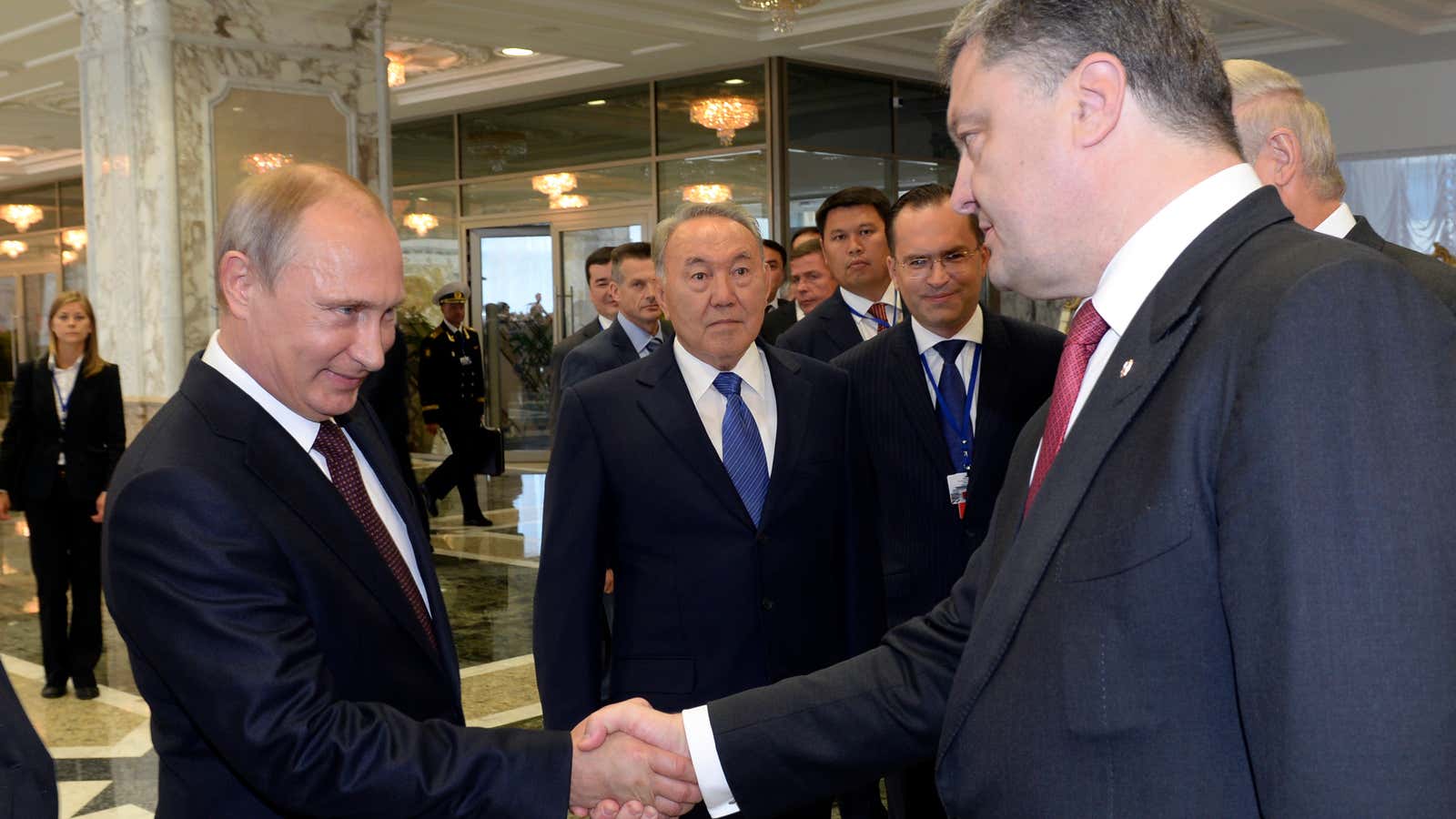It’s time to take stock of our geopolitical predictions for 2014, which we published a year ago. We got enough things right; but, like many others who play the prognostication game, we were blindsided by a year that seemed more unpredictable than any other in recent decades.
It was not the individual events that made 2014 so topsy-turvy: after all, what could top the 1991 Soviet collapse for sheer disruption of the status quo? The year instead was remarkable for the number of big, consequential and utterly unforeseen events—Russia’s invasion of Ukraine, the rise of ISIL, the diplomatic breakthrough between the US and Cuba, the emergence of US shale oil and the collapse of oil prices, not to mention a clutch of other economic, business and market events.
All in all, it has been evident for months that 2014 was a staggering maelstrom of surprises.
The problem, one observer said, is that no single prognosticator can consistently get all or even most of the big stuff right—you need to average together as many forecasts as you can. But that seems like a Hail Mary stab at forecasting: are a thousand forecasters acting collectively truly going to be better at predicting the actions of Russian president Vladimir Putin?
Tinkering with our own algorithm, which emphasizes a sensible reading of history, we found that a key shortcoming emerged in 2014: we grossly underestimated two factors in how nations and their leaders behave, which were the role of mountains and conspiracies.
For those new to Quartz’s rules of geopolitics, our system for projecting global events, “mountains” are nations or entities that are so large and their behavior at times so brazenly outside the norm that they tend to create or disrupt trends. Examples of such actors are the US, Saudi Arabia, ExxonMobil and Russia, each of which has over the years taken one or more dramatic actions that required peers to reassess their own, often firmly held positions. For that reason, they always bear watching.
But what was different in 2014 was how far outside the norm some mountains were prepared to veer, in particular Russia and Saudi Arabia.
Few observers are unfamiliar with Putin’s resentment-fueled, finger-in-the-eye foreign policy history. Still, while Ukraine was debating its economic future as the year began, neither we—nor, it appears, anyone else—predicted that Putin would respond by annexing Crimea, and reducing its eastern industrial cities to conflict zones. Likewise, no one forecast that Saudi Arabia would jettison (paywall) four decades of policy, embrace free market forces, and help to trigger the 50% plunge in oil prices that occurred between June and December.
Putin and Saudi Arabia thus conveyed an important lesson—that mountains not only shape and disrupt trends, but, as an aspect of their very brazenness, are prepared to take risks and inflict collateral damage to a degree most peers are not.
We learned a similar lesson with regard to the role of conspiracy in geopolitics. We generally play down this factor—while actors in events occasionally do in fact get together and mount dastardly conspiracies, such cases are rare.
What we failed to pay sufficient heed was the irrational propensity for some important people, including the mountains, to believe in conspiracies. Putin seemed convinced, for example, that the West’s Ukraine and oil policies both intend to break Russia apart, or at a minimum make it weak, an objective that in his reckoning has gone on for centuries. As we wrote last year, Iranian leader Ali Khamenei, too, seemed persuaded that the West’s ambition for his country was to bring it “to its knees.”
Under normal circumstances, one dismisses such paranoid talk with a laugh and a shrug. But in these cases, a conspiratorial mindset appeared to inform not only Putin’s, but his entire nation’s understanding of what went on in Ukraine. A large number of Russians believe the US, and not their own president, invaded Ukraine. Ultimately, this thinking led Putin to make 2014 the year that closed the door with finality on perestroika and glasnost, and reopened the long Russian (and Soviet) traditions of closed, xenophobic aggression.
Such plot-driven thinking also seemed to hold the potential to doom nuclear talks with Iran, negotiations that should have been regarded as having a win-win outcome. The West’s aim out of the talks was not to enfeeble Iran, which stood to gain profoundly from an economic standpoint should a deal be concluded, but to move on from the 1970s.
Therefore, we also alter and elevate the Conspiracy Rule—to wit, usually there is no conspiracy, but whether or not there is, when important actors believe one exists, their behavior can have profound geopolitical consequences.
How we fared in 2014
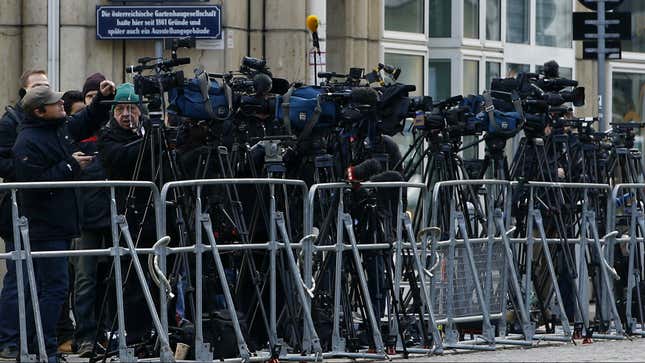
Nuclear talks with Iran: Iran and western-led negotiators failed to reach agreement by their November deadline, and decided to extend the talks through July 1, 2015. Last January, we guessed, wrongly, that the talks would go the other way—that the sides would sign a grand agreement by the deadline. We had reasoned that two impulses would drive Khamenei to sign: the Staying in Power rule, the desire of politicians everywhere to retain their jobs; and the Precipice Rule, the proclivity of the same leaders to shout, taunt and threaten but, at the last moment, to pull back from the brink and find a reasonable outcome. We reckoned that Khamanei would be driven by the memory of Iran’s disruptive 2009 Green Revolution, and cognizance of the public unhappiness that elected president Hassan Rouhani last year.
Khamenei’s conspiratorial mind may have been mainly responsible for his unwillingness to budge sufficiently on the demands of the western-led side, known as the P5+1—chiefly, to disengage most of Iran’s uranium-enriching centrifuges. But equally, he may not have felt particularly threatened nor on the precipice, even when oil prices plunged far below the estimated $131 a barrel that Iran needed to support the state budget. He may have embraced the consensus that prices would bounce back in the second half of 2015 so that he could hold fast for a better deal. In short, the prices may not have made him sweat.
We remain convinced that a deal would be rational from a realist perspective. But that will be a subject of our 2015 forecasts, which are to come, and for now we say simply that we got Iran wrong in 2014.
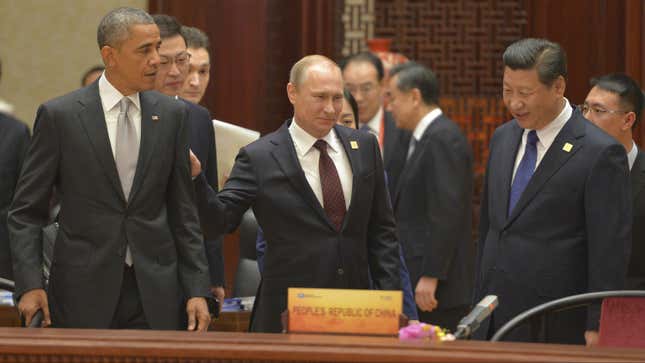
Iran and Russia’s politics: While Iran and P5+1 negotiated, a new challenge arose to both, and that was ISIL. In response, both the US and Iran attacked ISIL positions with men, aircraft and cash. Both sides did everything not to appear like allies on the issue. But the impact was inadvertent cooperation, putting Iran in the position for the first time in decades of being an actor alongside the West on the global stage.
We predicted that Iran would take a stronger hand in international crises, arguing so on the basis of the Rule of Averages, which states that nations and their leaders at times veer to the extremes, but eventually settle somewhere back in the middle. In addition, we observed that Iran wants to be treated as a great power, in line with the Mountain Rule.
These were not the reasons that Khamenei elected to attack ISIL. He instead was observing the Local Politics rule: Iran regards ISIL as a dangerous interloper in Tehran’s rightful sphere of influence, including Iraq and Syria. Yet, the effect was the same: Iran found reason to act in a way that arguably favored both it and the West.
For similar reasons, we predicted that Putin would notch down his tone, and be less of a spoiler in international affairs than in the past. Ukraine triggered his competing impulses, in line with the True Believer Rule, which explains leaders who act on ideological faith in their supposed other-worldly righteousness. In Putin’s case, it is his argument for Russian exceptionalism. Yet Putin’s continued desire for great power recognition was plain—throughout 2014, he continued to cooperate with the West on Iran policy (while toward the end of the year threatening to stop).

Fighting in Syria and Iraq: Peace failed yet again to break out; instead there was more pandemonium. On the basis of the Muddle-along Rule, which states that even countries in utter chaos tend not to implode but simply to trundle on, we forecast that moderate rebels, local tribes and government forces would gain ground and tamp down extremists. That did happen, but only after ISIL captured a third of Iraq, threatening the country’s integrity before a coalition of Kurdistan, Iran and the US stepped in to help. The year ended with a situation of controlled mayhem. Syria and Iraq were muddling along but grimly, as an estimated 15,000 security personnel and civilians died in Iraq alone.
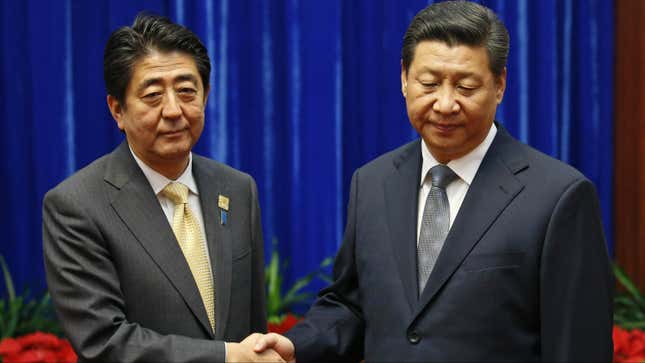
The East and South China seas: Beijing took its claims in the South China Sea further than ever. A decision to put down an oil rig near the Paracel Islands, waters claimed by Vietnam, triggered a tense standoff involving dozens of naval vessels. China’s moves were driven by the Territory Rule, which explains that almost no force in geopolitics gets a nation more overheated than someone stepping on its perceived territory, even a sliver of land or an uninhabited stone amid the sea. The same impulse led thousands of Vietnamese to riot and destroy Chinese businesses near Ho Chi Minh City, destruction that over-flowed to innocent Taiwanese enterprises. But, as we forecast, the Precipice Rule prevailed and outright fighting between the two countries did not break out. In November, Chinese leader Xi Jinping and Japanese prime minister Shinzo Abe even deigned to meet (pictured above), grudgingly putting aside the friction that has marked the two countries’ relations for four years.

US oil exports: The American oil patch overflowed, rising to an astonishing four-decade high above 9 million barrels a day of production. The oil industry and affiliated experts bellowed in response that the Obama administration had to—had to!—lift a four-decade-old ban on crude oil exports. They argued that a repeal would improve the US economy and lower gasoline prices. We forecast correctly that the Local Politics rule would confound the industry—sending crude oil abroad seems unpatriotic to most Americans, who grow up hearing politicians fulminate about Saudi Arabia and the Middle East in general, not to mention explaining the nirvana of oil independence.
The year ended, as we thought, with the administration opening the door a mollifying sliver, allowing the export of an ultra-light grade called condensate, but otherwise maintaining the ban.
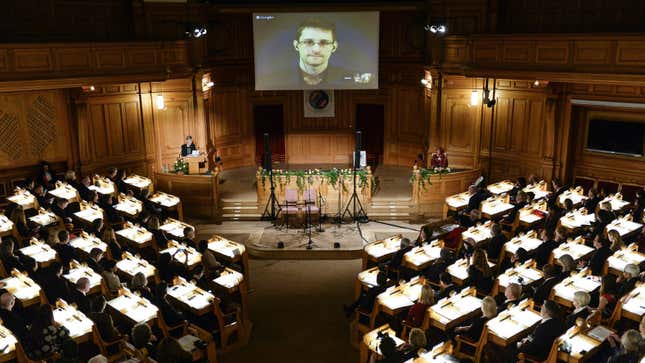
The fate of Edward Snowden: The New York Times started off the year with an appeal for clemency or a short, plea-bargained prison sentence for Snowden, whose 2013 leak of classified intelligence shook US and global politics. Others piled on in agreement with the newspaper. We had already invoked the Staying in Power and Local Politics rules to argue that Snowden would obtain no reprieve—Obama would have inflicted untold self-damage with a move that would have been widely pilloried as countenancing treason. We were right.
